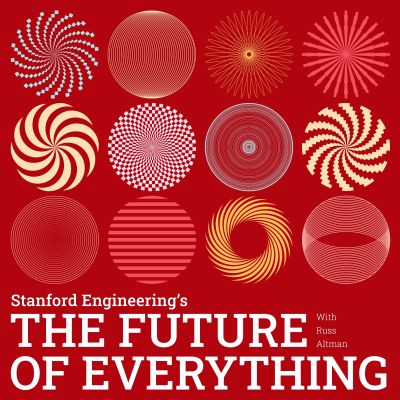Host Russ Altman, a professor of bioengineering, genetics, and medicine at Stanford, is your guide to the latest science and engineering breakthroughs. Join Russ and his guests as they explore cutting-edge advances that are shaping the future of everything from AI to health and renewable energy. Along the way, “The Future of Everything” delves into ethical implications to give listeners a well-rounded understanding of how new technologies and discoveries will impact society. Whether you’re a researcher, a student, or simply curious about what’s on the horizon, tune in to stay up-to-date on the latest developments that are transforming our world.
https://engineering.stanford.edu/magazine/future-everything
episode 261: The future of measuring cancer
Guest Olivier Gevaert is an expert in multi-modal biomedical data modeling and recently developed new methods in the new science of “spatial transcriptomics” that are able to predict how cancer cells present spatially and will behave in the future.
Tumors are not monolithic, he says, but made up of various cell types. Spatial transcriptomics measures cells in the undisturbed organization of the tumor itself and enables a more detailed study of tumors. This new technology can be used to determine what type of cells are present spatially and how each cell influences neighboring cells. It paints a picture of tumor heterogeneity, Gevaert tells host Russ Altman on this episode of Stanford Engineering’s The Future of Everything podcast.
Episode Reference Links:
- Olivier Gevaert: Standford Profile
- Olivier Gevaert’s Research Lab
- The Cancer Genome Atlas Program (TCGA)
Connect With Us:
- Episode Transcripts >>> The Future of Everything Website
- Connect with Russ >>> Threads or Twitter/X
- Connect with School of Engineering >>> Twitter/X
Chapters:
(00:00:00) Introduction to Olivier Gavaert
His work in the advancement of spatial transcriptomics technologies.
(00:02:52) The Basics of Transcriptomics
Transcriptomics’ significance in identifying active genes in cancer cells and the technological advancements enabling this research.
(00:05:34) Heterogeneity and Cell interaction in Cancer
Heterogeneity within cancer cells and the importance of analyzing the interactions between various cell types to develop treatments.
(00:07:19) Advancements in Brain Cancer Research
Recent studies on brain cancer using spatial omics techniques to understand tumor cell types and their spatial organization for prognosis prediction.
(00:10:53) AI and Whole Slide Imaging in Oncology
How AI and machine learning are combined with whole slide imaging to enhance data resolution and interpret spatial transcriptomic data.
(00:14:49) Enhancing Pathology with AI
Integrating AI with pathology to improve cancer diagnosis and treatment by analyzing whole slide images and predicting cell types.
(00:18:40) Multimodal Data Fusion in Cancer Treatment
Importance of combining different data modalities to create comprehensive models for personalized cancer treatment.
(00:24:49) The Future of Synthetic Data and Digital Twins
Synthetic data and digital twins in oncology, and how these technologies can simulate treatment outcomes and support personalized medicine.
(00:29:16) Conclusion
Connect With Us:
Episode Transcripts >>> The Future of Everything Website
Connect with Russ >>> Threads or Twitter/X
Connect with School of Engineering >>> Twitter/X
